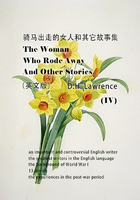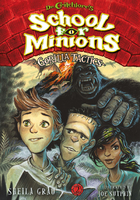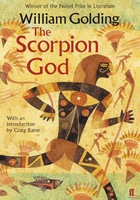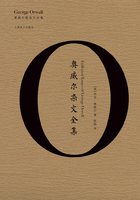We arrived at the house in which I lived. I would not ask him to come in with me, but walked up the stairs without a word. He followed me, and entered the apartment on my heels. He had not been in it before, but he never gave a glance at the room I had been at pains to make pleasing to the eye. There was a tin of tobacco on the table, and, taking out his pipe, he filled it. He sat down on the only chair that had no arms and tilted himself on the back legs.
"If you're going to make yourself at home, why don't you sit in an arm-chair?" I asked irritably.
"Why are you concerned about my comfort?"
"I'm not," I retorted, "but only about my own. It makes me uncomfortable to see someone sit on an uncomfortable chair."
He chuckled, but did not move. He smoked on in silence, taking no further notice of me, and apparently was absorbed in thought. I wondered why he had come.
Until long habit has blunted the sensibility, there is something disconcerting to the writer in the instinct which causes him to take an interest in the singularities of human nature so absorbing that his moral sense is powerless against it. He recognises in himself an artistic satisfaction in the contemplation of evil which a little startles him; but sincerity forces him to confess that the disapproval he feels for certain actions is not nearly so strong as his curiosity in their reasons. The character of a scoundrel, logical and complete, has a fascination for his creator which is an outrage to law and order. I expect that Shakespeare devised Iago with a gusto which he never knew when, weaving moonbeams with his fancy, he imagined Desdemona. It may be that in his rogues the writer gratifies instincts deep-rooted in him, which the manners and customs of a civilised world have forced back to the mysterious recesses of the subconscious. In giving to the character of his invention flesh and bones he is giving life to that part of himself which finds no other means of expression. His satisfaction is a sense of liberation.
The writer is more concerned to know than to judge.
There was in my soul a perfectly genuine horror of Strickland, and side by side with it a cold curiosity to discover his motives. I was puzzled by him, and I was eager to see how he regarded the tragedy he had caused in the lives of people who had used him with so much kindness. I applied the scalpel boldly.
"Stroeve told me that picture you painted of his wife was the best thing you've ever done."
Strickland took his pipe out of his mouth, and a smile lit up his eyes. "It was great fun to do."
"Why did you give it him?"
"I'd finished it. It wasn't any good to me." "Do you know that Stroeve nearly destroyed it?" "It wasn't altogether satisfactory."
He was quiet for a moment or two, then he took his pipe out of his mouth again, and chuckled.
"Do you know that the little man came to see me?" "Weren't you rather touched by what he had to say?" "No; I thought it damned silly and sentimental."
"I suppose it escaped your memory that you'd ruined his life?" I remarked.
He rubbed his bearded chin reflectively. "He's a very bad painter."
"But a very good man."
"And an excellent cook," Strickland added derisively.
His callousness was inhuman, and in my indignation I was not inclined to mince my words.
"As a mere matter of curiosity I wish you'd tell me, have you felt the smallest twinge of remorse for Blanche Stroeve's death?"
I watched his face for some change of expression, but it remained impassive.
"Why should I?" he asked.
"Let me put the facts before you. You were dying, and Dirk Stroeve took you into his own house. He nursed you like a mother. He sacrificed his time and his comfort and his money for you. He snatched you from the jaws of death."
Strickland shrugged his shoulders.
"The absurd little man enjoys doing things for other people. That's his life."
"Granting that you owed him no gratitude, were you obliged to go out of your way to take his wife from him? Until you came on the scene they were happy. Why couldn't you leave them alone?"
"What makes you think they were happy?" "It was evident."
"You are a discerning fellow. Do you think she could ever have forgiven him for what he did for her?"
"What do you mean by that?"
"Don't you know why he married her?" I shook my head.
"She was a governess in the family of some Roman prince, and the son of the house seduced her. She thought he was going to marry her. They turned her out into the street neck and crop. She was going to have a baby, and she tried to commit suicide. Stroeve found her and married her."
"It was just like him. I never knew anyone with so compassionate a heart."
I had often wondered why that ill-assorted pair had married, but just that explanation had never occurred to me. That was perhaps the cause of the peculiar quality of Dirk's love for his wife. I had noticed in it something more than passion. I remembered also how I had always fancied that her reserve concealed I knew not what; but now I saw in it more than the desire to hide a shameful secret. Her tranquillity was like the sullen calm that broods over an island which has been swept by a hurricane. Her cheerfulness was the cheerfulness of despair. Strickland interrupted my reflections with an observation the profound cynicism of which startled me.
"A woman can forgive a man for the harm he does her," he said, "but she can never forgive him for the sacrifices he makes on her account."
"It must be reassuring to you to know that you certainly run no risk of incurring the resentment of the women you come in contact with," I retorted.
A slight smile broke on his lips.
"You are always prepared to sacrifice your principles for a repartee," he answered.
"What happened to the child?"
"Oh, it was still-born, three or four months after they were married." Then I came to the question which had seemed to me most puzzling. "Will you tell me why you bothered about Blanche Stroeve at all?"
He did not answer for so long that I nearly repeated it.
"How do I know?" he said at last. "She couldn't bear the sight of me. It amused me."
"I see."
He gave a sudden flash of anger. "Damn it all, I wanted her."
But he recovered his temper immediately, and looked at me with a smile.
"At first she was horrified." "Did you tell her?"
"There wasn't any need. She knew. I never said a word. She was frightened. At last I took her."
I do not know what there was in the way he told me this that extraordinarily suggested the violence of his desire. It was disconcerting and rather horrible. His life was strangely divorced from material things, and it was as though his body at times wreaked a fearful revenge on his spirit. The satyr in him suddenly took possession, and he was powerless in the grip of an instinct which had all the strength of the primitive forces of nature. It was an obsession so complete that there was no room in his soul for prudence or gratitude.
"But why did you want to take her away with you?" I asked.
"I didn't," he answered, frowning. "When she said she was coming I was nearly as surprised as Stroeve. I told her that when I'd had enough of her she'd have to go, and she said she'd risk that." He paused a little. "She had a wonderful body, and I wanted to paint a nude. When I'd finished my picture I took no more interest in her." "And she loved you with all her heart."
He sprang to his feet and walked up and down the small room.
"I don't want love. I haven't time for it. It's weakness. I am a man, and sometimes I want a woman. When I've satisfied my passion I'm ready for other things. I can't overcome my desire, but I hate it; it imprisons my spirit; I look forward to the time when I shall be free from all desire and can give myself without hindrance to my work. Because women can do nothing except love, they've given it a ridiculous importance. They want to persuade us that it's the whole of life. It's an insignificant part. I know lust. That's normal and healthy. Love is a disease. Women are the instruments of my pleasure; I have no patience with their claim to be helpmates, partners, companions."
I had never heard Strickland speak so much at one time. He spoke with a passion of indignation. But neither here nor elsewhere do I pretend to give his exact words; his vocabulary was small, and he had no gift for framing sentences, so that one had to piece his meaning together out of interjections, the expression of his face, gestures and hackneyed phrases.
"You should have lived at a time when women were chattels and men the masters of slaves," I said.
"It just happens that I am a completely normal man."
I could not help laughing at this remark, made in all seriousness; but he went on, walking up and down the room like a caged beast, intent on expressing what he felt, but found such difficulty in putting coherently.
"When a woman loves you she's not satisfied until she possesses your soul. Because she's weak, she has a rage for domination, and nothing less will satisfy her. She has a small mind, and she resents the abstract which she is unable to grasp. She is occupied with material things, and she is jealous of the ideal. The soul of man wanders through the uttermost regions of the universe, and she seeks to imprison it in the circle of her account-book. Do you remember my wife? I saw Blanche little by little trying all her tricks. With infinite patience she prepared to snare me and bind me. She wanted to bring me down to her level; she cared nothing for me, she only wanted me to be hers. She was willing to do everything in the world for me except the one thing I wanted: to leave me alone." I was silent for a while.
"What did you expect her to do when you left her?"
"She could have gone back to Stroeve," he said irritably. "He was ready to take her."
"You're inhuman," I answered. "It's as useless to talk to you about these things as to describe colours to a man who was born blind."
He stopped in front of my chair, and stood looking down at me with an expression in which I read a contemptuous amazement.
"Do you really care a twopenny damn if Blanche Stroeve is alive or dead?"
I thought over his question, for I wanted to answer it truthfully, at all events to my soul.
"It may be a lack of sympathy in myself if it does not make any great difference to me that she is dead. Life had a great deal to offer her. I think it's terrible that she should have been deprived of it in that cruel way, and I am ashamed because I do not really care."
"You have not the courage of your convictions. Life has no value. Blanche Stroeve didn't commit suicide because I left her, but because she was a foolish and unbalanced woman. But we've talked about her quite enough; she was an entirely unimportant person. Come, and I'll show you my pictures."
He spoke as though I were a child that needed to be distracted. I was sore, but not with him so much as with myself. I thought of the happy life that pair had led in the cosy studio in Montmartre, Stroeve and his wife, their simplicity, kindness, and hospitality; it seemed to me cruel that it should have been broken to pieces by a ruthless chance; but the cruellest thing of all was that in fact it made no great difference. The world went on, and no one was a penny the worse for all that wretchedness. I had an idea that Dirk, a man of greater emotional reactions than depth of feeling, would soon forget; and Blanche's life, begun with who knows what bright hopes and what dreams, might just as well have never been lived. It all seemed useless and inane.
Strickland had found his hat, and stood looking at me.
"Are you coming?"
"Why do you seek my acquaintance?" I asked him. "You know that I hate and despise you."
He chuckled good-humouredly.
"Your only quarrel with me really is that I don't care a twopenny damn what you think about me."
I felt my cheeks grow red with sudden anger. It was impossible to make him understand that one might be outraged by his callous selfishness. I longed to pierce his armour of complete indifference. I knew also that in the end there was truth in what he said. Unconsciously, perhaps, we treasure the power we have over people by their regard for our opinion of them, and we hate those upon whom we have no such influence. I suppose it is the bitterest wound to human pride. But I would not let him see that I was put out.
"Is it possible for any man to disregard others entirely?" I said, though more to myself than to him. "You're dependent on others for everything in existence. It's a preposterous attempt to try to live only for yourself and by yourself. Sooner or later you'll be ill and tired and old, and then you'll crawl back into the herd. Won't you be ashamed when you feel in your heart the desire for comfort and sympathy? You're trying an impossible thing. Sooner or later the human being in you will yearn for the common bonds of humanity."
"Come and look at my pictures." "Have you ever thought of death?" "Why should I? It doesn't matter."
I stared at him. He stood before me, motionless, with a mocking smile in his eyes; but for all that, for a moment I had an inkling of a fiery, tortured spirit, aiming at something greater than could be conceived by anything that was bound up with the flesh. I had a fleeting glimpse of a pursuit of the ineffable. I looked at the man before me in his shabby clothes, with his great nose and shining eyes, his red beard and untidy hair; and I had a strange sensation that it was only an envelope, and I was in the presence of a disembodied spirit.
"Let us go and look at your pictures," I said.














